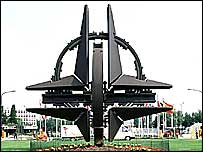 From atlantic-community.org: NATO has been threatened throughout its existence by diverging interests of its members – or to be precise, by the lack of trust in the solidarity of its members in the light of these diverging interests. The persistent mistrust of some European members concerning the willingness of the United States to risk their own survival for the sake of Alliance security was a constant background issue in all major strategic debates in NATO in the Cold War period. Nevertheless, the Alliance has been able to overcome all of these crises through its ability to build a consensus that secured the needed level of solidarity and engagement among all of its members. This was never fully satisfying for both NATO’s critics and enthusiasts but preserved very successfully the Alliance and its cohesion…
From atlantic-community.org: NATO has been threatened throughout its existence by diverging interests of its members – or to be precise, by the lack of trust in the solidarity of its members in the light of these diverging interests. The persistent mistrust of some European members concerning the willingness of the United States to risk their own survival for the sake of Alliance security was a constant background issue in all major strategic debates in NATO in the Cold War period. Nevertheless, the Alliance has been able to overcome all of these crises through its ability to build a consensus that secured the needed level of solidarity and engagement among all of its members. This was never fully satisfying for both NATO’s critics and enthusiasts but preserved very successfully the Alliance and its cohesion…
The current dissent – basically the result of an overextension of solidarity from 2003 2005 – is only the aftershock of the Iraq-Crisis and has been fading since 2006. Efforts from both sides and changes of Governments have contributed to closing the transatlantic rift. Therefore, NATO should be able to define the current level of solidarity and cohesion much more precisely in the upcoming strategic concept. This could then be the starting point for renewed Alliance cohesion…
A recent Council of Foreign Relations Study stated rightfully that "While the bonds across the Atlantic might be frayed, they are stronger than those tying the United States to other parts of the World". The same is true for all European Nations since NATO enables its members to cooperate with allies in a way that would be practically impossible without formal institutions, in place military structures, and – most importantly – defined rules and procedures for consensus building. However, building consensus was never easy in NATO. The current problems the Alliance has to face in Afghanistan and at its home fronts will not make it easier. The processes described above, though, allow for a considerable amount of optimism that NATO will again be able to overcome these difficulties, reach a new consensus and maintain its cohesion. (photo: BBC)
Image: nato_hq_bbc.jpg
